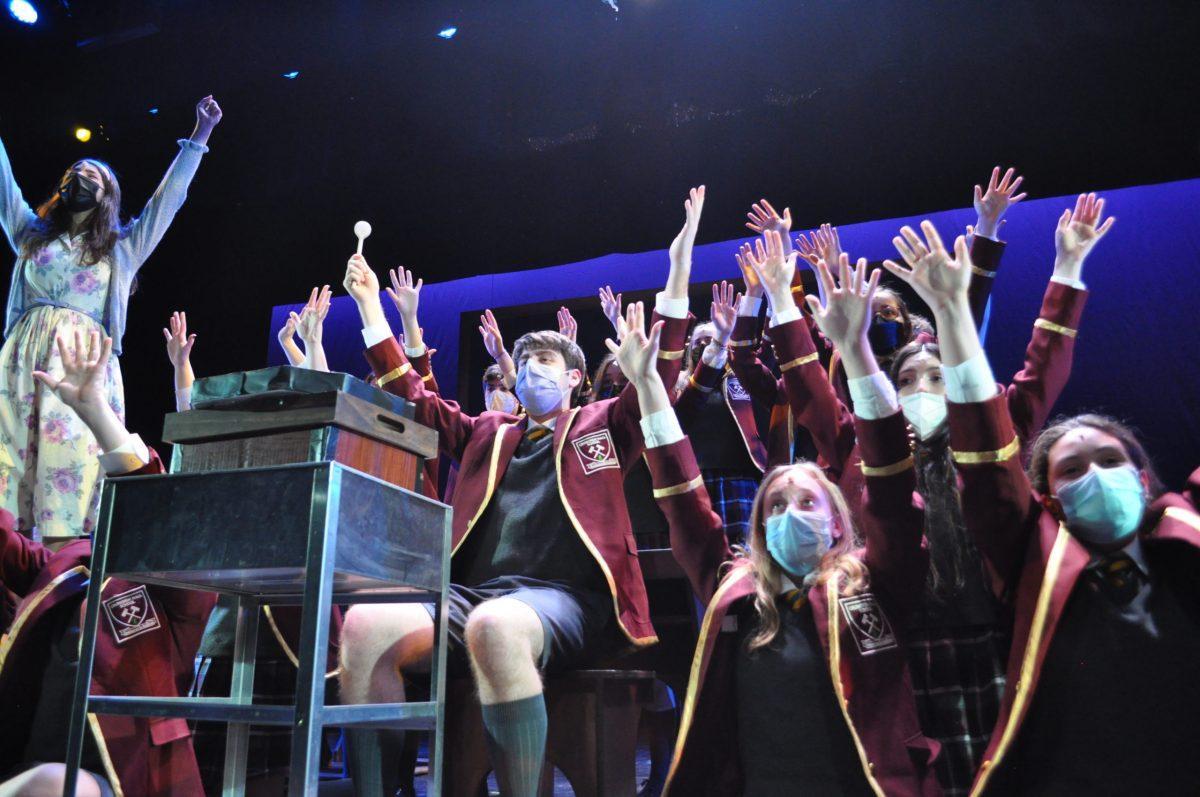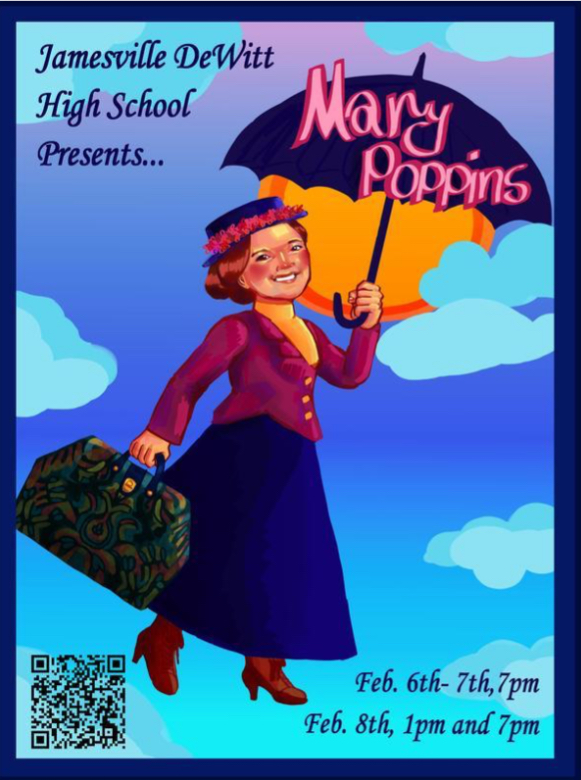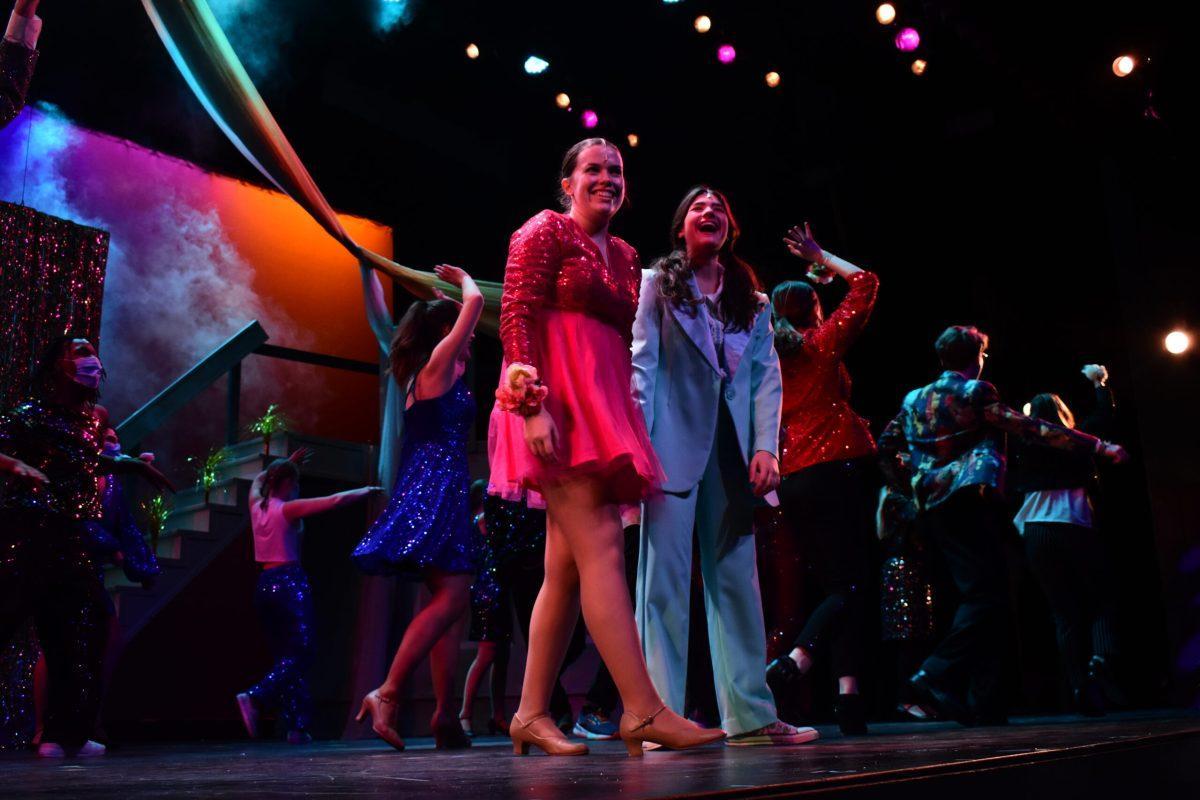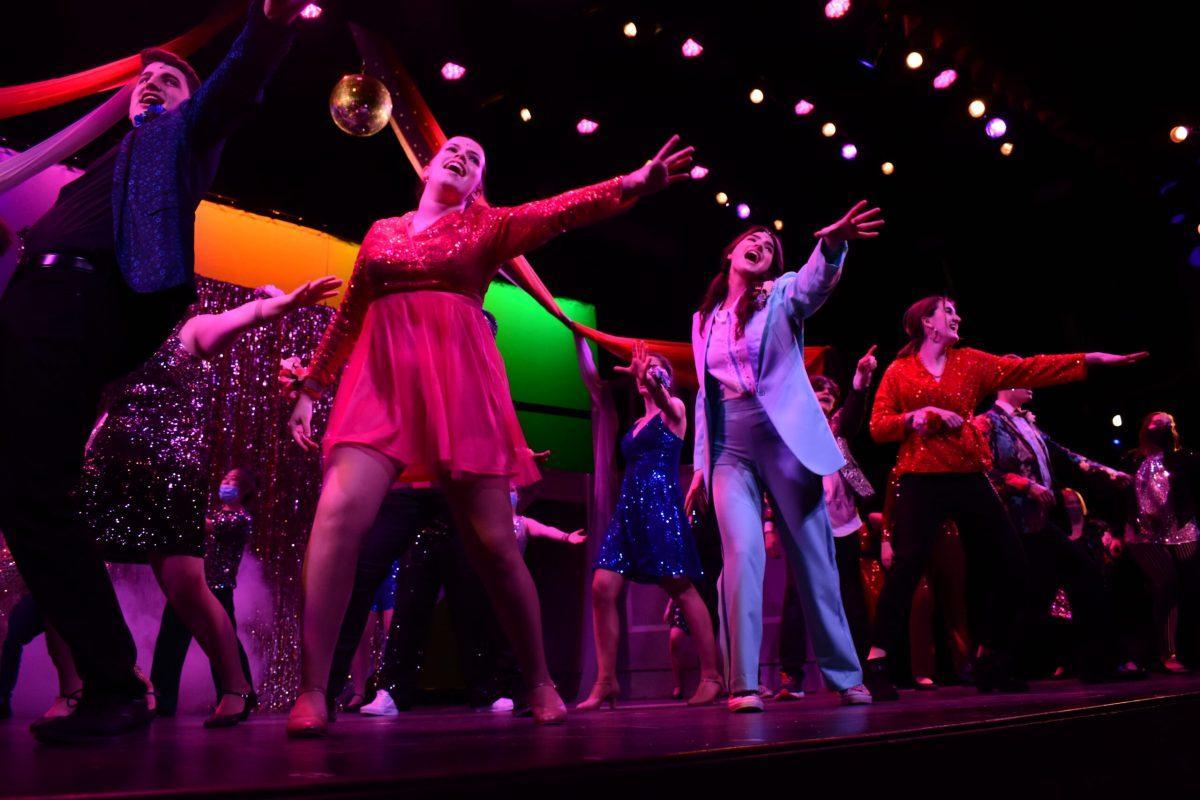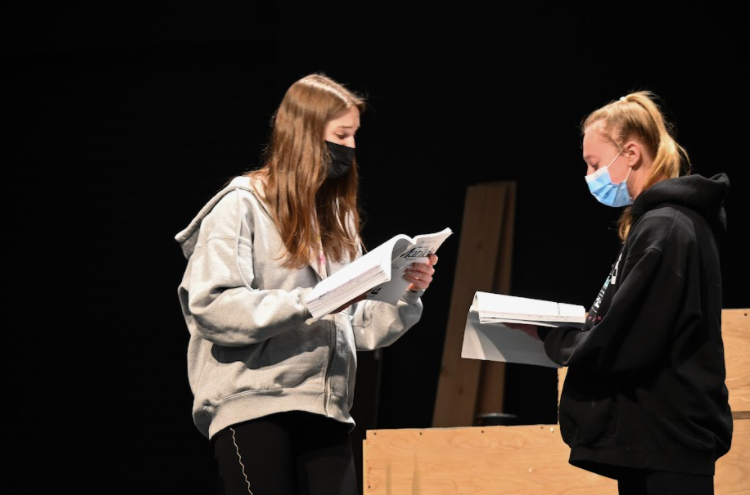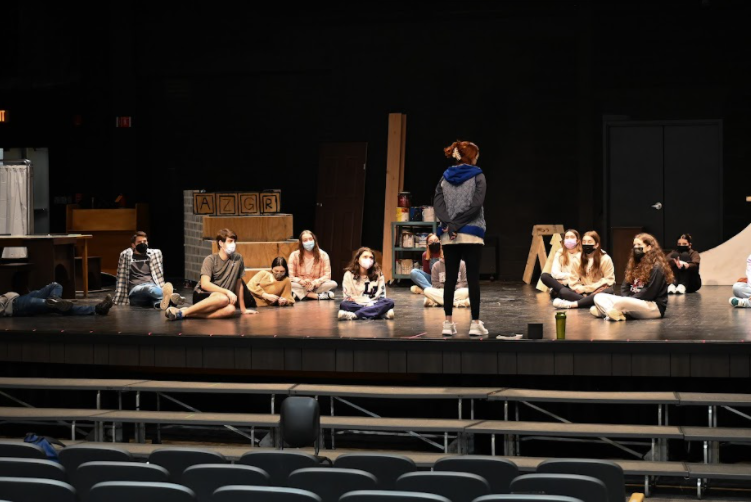From Thursday, February 10, to Saturday, February 12, dozens of talented J-DHS students took the stage to perform this year’s musical, “Matilda.” Roald Dahl’s “Matilda” is a popular British children’s book about a young girl, Matilda Wormwood, whose parents are mean to her. She reads constantly, much to the chagrin of her parents, who believe it is a waste of time; she taught herself to read by age four by going to the library.
In the story, Matilda, now five years old, attends school for the first time. Her principal, Ms. Trunchbull, a former hammer-throwing champion, is a stickler for the rules, and her “discipline,” as she calls it, is downright abuse. Conversely, her classroom teacher, Miss Honey, is as sweet as the food she is named for. Miss Honey dedicates herself to enriching her new gifted student, Matilda, while “the Trunchbull,” as she is known around the school, does her best to undermine Miss Honey’s efforts, as she believes Matilda is a mean girl (although she believes this about all the students, who she refers to as “maggots”).
Throughout the musical, Miss Honey teaches Matilda lessons about gratitude, kindness, and caring. Nonetheless, Matilda clearly has a strong moral compass as it is, presumably from all the books she reads. A theme of the show is her ability to distinguish between right and wrong, and she consistently proclaims, “That’s not right!” when she sees injustice, either by the Trunchbull or by her father (who scams some Russians into buying “luxury cars,” which were actually junk).
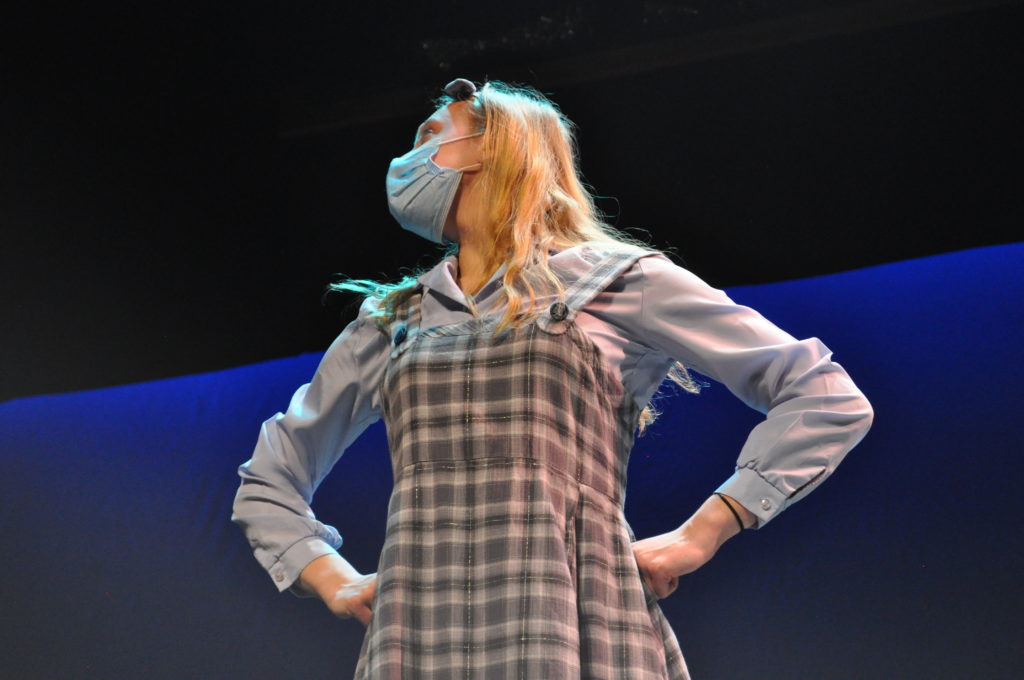
Matilda’s storytelling is phenomenal. At the tender age of five, she delivers moving stories every day to Mrs. Phelps, the librarian. In the musical, Matilda makes up a story about The Escapologist and The Acrobat, two renowned performers who were sad on the inside because they didn’t have a child. The two plan a daring stunt, with the help of The Acrobat’s sinister sister, who forces the two to sign a contract forcing them to perform the stunt. This becomes an issue when The Acrobat becomes pregnant. When she tries to cancel the stunt, her sister is furious. The two perform the stunt, but then The Acrobat dies in childbirth. The Escapologist enlists The Acrobat’s sister’s help to raise the child, and the sister abuses the child. The Escapologist discovers his sister-in-law’s treatment of Matilda and vows to protect his daughter, but he dies and The Acrobat’s sister falsely claims he left her his house. She promptly kicks the girl out of the house. However, when sitting with Miss Honey in her small shed she calls home, Matilda, stunned, realizes the story is not made up. It’s Miss Honey’s story! Miss Honey is the abused little girl, and her aunt, The Acrobat’s sister, is the Trunchbull. Later in the show, it is revealed that The Escapologist’s will actually bequeathed the house to Miss Honey, and the Trunchbull is forced on the run. Miss Honey had never been able to afford a house, as her aunt forced her to pay her back for every item she had ever bought Miss Honey, but now she has a real house of her own.
At the end of the show, Mr. Wormwood (Matilda’s father) has to move his family to Germany to escape the Russians he scammed – it turns out it was the Russian mafia. He has limited room, so he allows Matilda, whom he disliked, unlike his son, Michael, to live with Miss Honey. Despite Matilda never making up with her parents in the show, the story has a happy ending.
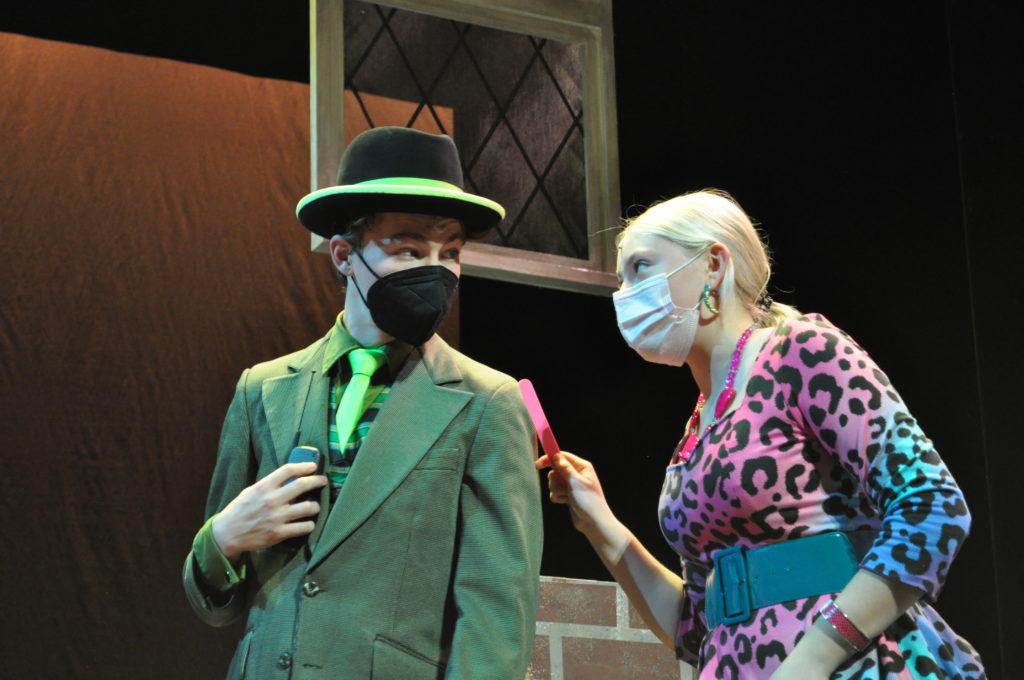
The lead roles were taken on by some long-time actors and actresses, as well as some new faces. Matilda was played by senior Michelle Tanchak, Ms. Trunchbull by senior Emma Velardi, Miss Honey by sophomore Alex Bronchetti, Mr. Wormwood by junior Nathan Warren-Faricy, Mrs. Wormwood by junior Ava Harle, Michael Wormwood by sophomore Thomas Vander Molen, Mrs. Phelps by junior Nicole Meskos, Rudolpho (Mrs. Wormwood’s flamboyant salsa partner) by senior Samuel Kim, The Escapologist by junior Christian Fuller, and The Acrobat by sophomore Katherine Saluti.
What stood out to me was the remarkable acting and singing ability demonstrated by the cast members. Of course, there were the British accents, which were amusingly pulled off with varying degrees of success by the cast. Tanchak was able to perfectly emulate the voice and mannerisms of a five-year-old girl, while Bronchetti’s somber facial expressions, meek appearance, and beautiful voice sold me on her performance. Meanwhile, Warren-Faricy lit up the stage with his humor every time he appeared; as Mr. Wormwood, he was the bad guy who loved television, loved making money, and hated his daughter (because he had wanted another son). As Mrs. Wormwood, Harle had to embody a loud, overly showy character who mocks Miss Honey for wanting to teach Matilda. She played the part with zest and zeal, demonstrating her ability to work outside her comfort zone.
The pit orchestra did an extraordinary job bringing the musical to life. The instrumental to the show fit perfectly with the scenes, and band and orchestra teacher Daniel Blumenthal’s conducting was a sight to behold. The 29 pit orchestra members, playing instruments ranging from the flute to the trumpet to the viola, blew me away. Furthermore, the costume designers, set builders, and other stagehands truly made the show more entertaining through the costumes and props. The musical was directed by Dani Ryan and produced by psychology and history teacher Jordan Berger.
If I had to come up with one criticism of the show, it would be the choice to perform “Matilda” in the first place over more culturally, socially, and politically relevant shows.
“I’m going to miss the amazing people that I had the pleasure to work with over these last four years.”
Christian McVicker (Bruce)
Senior Christian McVicker played Bruce, a classmate of Matilda’s who was punished by the Trunchbull by being forced to eat an entire cake. According to McVicker, “I thought that Matilda went really great for me. There are so many things I’m gonna miss about the show, including our awesome choreography, the fun songs, and all of the memories I have made. Most of all, I’m going to miss the amazing people that I had the pleasure to work with over these last four years, whether they were part of the cast, pit, crew, or the inspiring production team. The musicals will always be the highlight of my high school experience for me, and I wouldn’t change that for the world.”
“It was such a great experience and the cast, crew, and pit work so closely. Everyone’s role is so important. All of the directors are amazing and help us so much,” says Nicki Meskos.
Warren-Faricy enjoyed playing the bad guy. “I had a good time playing Mr Wormwood. It was really nice to be back on stage with a live audience. It was my first time playing a villain in a show and I enjoyed it. It’s kind of fun to be able to yell and be rude and to make the audience dislike me. I heard someone describe him as ‘aggressively idiotic’ and I think that’s pretty fitting. Overall it was definitely a positive experience and I’m looking forward to another year of the show.”
Tanchak says she had a rewarding experience taking on the lead role. “It was an incredible experience to play Matilda, as I had never done anything like it before. I worked on the way I wanted my voice to sound while speaking and singing since Matilda is a young kid. It was fairly easy for me to find a voice that fit, and it just got better as rehearsals went on. I started memorizing my lines early on because I had a lot of monologues in many scenes. It was also important that I rested my voice as much as possible because I didn’t want to ruin it before the performances. Lastly, although Matilda is mature for her age, I still needed to act like a little kid. I was more comfortable doing so after rehearsing the scenes over and over and truly becoming the character. Overall I had a wonderful time playing Matilda and getting to perform this musical!”
Bronchetti enjoyed the experience of acting with her friends. “Overall it was a great experience! I had seen Matilda multiple times before, so I was definitely familiar with the character of Miss Honey. What I love about Miss Honey is that she exudes kindness and has a deep, genuine relationship with Matilda and her students. Being friends with Michelle, who played Matilda, definitely helped our characters develop a meaningful relationship on stage. I relate a lot to Miss Honey, so getting into character was not too difficult for me. Overall, I really enjoyed being able to bring Miss Honey to life and getting to bond with my castmates!”
Berger is proud of the cast members of this year’s play. “Matilda: the Musical went extremely well and we are so proud of the efforts made by the entire cast, crew, and pit! Students were excited to get back on the stage after our filmed show last year and it showed. The performances demonstrated the love that each student had for telling a great story, whether they were in the cast, playing an instrument, or backstage running the show from behind the scenes.”
“It’s all about relationships and I truly believe that if we support one another, good things will happen!”
Producer Jordan Berger
In the future, Berger hopes to further improve the school musical. “My hope is that we are able to get back to performing without masks so that the audience is able to better connect with the actors and see facial expressions/emotions. Each year, we try to ‘raise the bar’ for the students and our staff so that we can continuously improve and grow with each other. It’s all about relationships and I truly believe that if we support one another, good things will happen!”
The camaraderie created through months of hard work will not soon be forgotten. “It’s a dream being able to work with so many talented and committed people. From the students to the staff, everyone was passionate and determined to make this show a success. We had great energy and there was a real sense of cohesion, unity, and positive culture that we were able to foster throughout the process,” says Berger.
Rehearsals – of which there were many – were not without their challenges. According to Berger, “We had to navigate performing a musical on a stage wearing masks with a limited capacity audience. In theatre, you want the freedom to explore your character, your space, and tell a great story. It was challenging to have spacing limitations for the actors and for them to figure out how to sing with masks. As the producer, I struggled with balancing the safety of our audience members with being able to sell tickets and guarantee a profitable show. We also had to worry about the impact that someone getting COVID close to the start of the show would have on our production. Luckily, we were able to survive the initial spike after [holiday] break and completed a successful run of Matilda.”






























